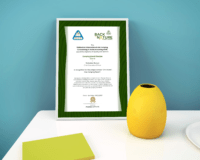It is true that camping, caravanning and motorcaravanning activities promote a unique connection with nature. However, this proximity also requires us to preserve the environment for future generations. At a time when environmental awareness is a priority and a growing concern among those who practice these activities, here are some practical tips to make activities more ecologically friendly and minimize one’s ecological footprint during outdoor adventures.
1- Choose sustainable materials
- Long-lasting equipment: choose tents, backpacks, and other camping equipment made from recycled or sustainable materials. Higher quality products can last for years, thus reducing the need for frequent replacements.
- Reusable utensils: Avoid disposable plates, cutlery, and cups and replace them with reusable versions, such as those made from materials like stainless steel, bamboo, or silicone, which are more durable and environmentally friendly.
- Sustainable clothing: choose clothing made from organic materials, such as cotton, or recycled synthetics, and check that they are produced ethically.
2. Zero waste practices
- Reduce food waste: Before heading out on an adventure, plan your meals to avoid leftovers and use reusable packaging to store food.
- Collect rubbish: Take rubbish bags to collect all waste. Adopt the practice of “leave no trace” and collect everything you take, including micro waste such as fruit peel or cigarette butts.
3. Conserve natural resources
- Responsible use of water: minimize water consumption, using it efficiently for washing utensils and personal hygiene. Use biodegradable soap and avoid polluting natural water sources.
- Solar energy: Use portable solar panels to charge electronic devices rather than relying on generators or disposable batteries. This not only reduces carbon emissions, but is also more practical in remote areas.
- Sustainable hiking: Follow marked paths to avoid damaging vegetation and wildlife. Respect protected areas and avoid interacting with wild animals to avoid disturbing their natural habitats.
4. Sustainable transport
- Vehicles: if possible, use and opt for vehicles with lower carbon emissions. Plan efficient routes to reduce kilometers and, consequently, fuel consumption.
- Share trips: Consider sharing the trip with friends or other campers to reduce the number of vehicles on the road, lowering your carbon footprint.
- Biking and walking: When possible, explore the surrounding area on foot or by bike. It is a healthy and ecological way to get to know nature better.
5. Respect fauna and flora
- Native plants: Avoid planting and introducing non-native species wherever you travel, as this can unbalance local ecosystems.
- Wildlife protection: keep a safe distance from animals and never feed them, as this can create situations of dependency and disrupt the animals’ natural behavior.
- Leave the place better than you found it: a valuable practice is to pick up all the trash you find, even if it’s not yours thereby actively contributing to the preservation of the environment.
6. Education
- Share knowledge: Whenever possible, share and inspire other campers with your sustainable practices. Collective knowledge can help protect the environment on a larger scale.
- Learn about the place: Before heading off on a new adventure, learn about the region’s ecology and local conservation practices. This will help you make more informed and environmentally respectful choices.
Together, we can make a difference and continue to enjoy outdoor adventures in a responsible and sustainable way. Sustainability is not just a trend, but a responsibility that we must all adopt to ensure that the natural wonders we enjoy today can be enjoyed tomorrow by future generations.
The F.I.C.C. wishes you a wonderful journey!





